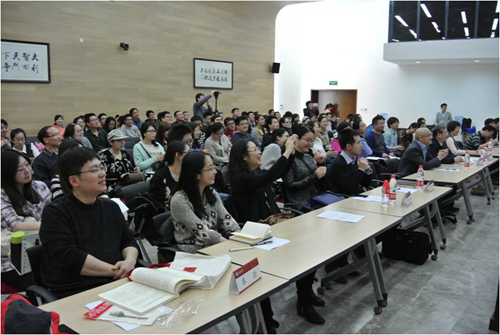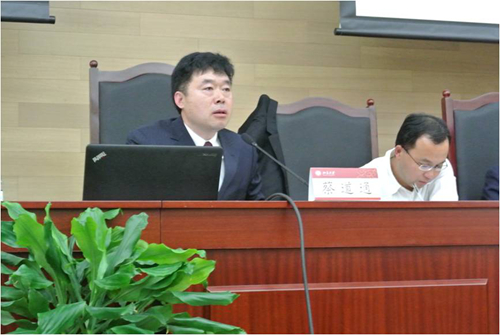30th "Contemporary Criminal Law Forum" held successfully
Date:2015-04-08
At 6:30p.m.on March 26, 2015, 30th "Contemporary Criminal Law Forum" held successfully at Koguan Building moot court of Peking University Law School. This forum is sponsored by Yang Chunxi Legal Education and Research Foundation and organized by Peking University Law School, Qsinghua University School of Law, Renmin University of China Law School, Criminal Justice College of China University of Political Science and Law and China Youth University of Political Studies School of Law. The theme of forum is Application of "Special Law Derogates General Law" Principle: Base on Analyses about Financial Fraud. Prof. Cai Daotong form the Law School of Nanjing Normal University was the keynote speaker.

Prof. Liang Genlin from Peking University Law School hosted this forum. The discussants of this forum are as follows: Prof. Liu Mingxiang from Renmin University of China Law School, Prof. Lin Wei from China Youth University of Political Studies School of Law, Associate Prof. Li Lizhong from Renmin University of China Law School, Associate Prof. Fang Peng from Criminal Justice College of China University of Political Science and Law. This forum invites Prof. Chen Xingliang, Associate Prof Che Hao, Associate Prof Jiang Su from Peking University Law School, Prof. Zhou Guangquan from Qsinghua University School of Law, Associate Prof. Chen Xuan from Renmin University of China Law School, Prof. Li Weihong, Associate Prof. He Qingren from China Youth University of Political Studies School of Law, Associate Prof. Sun Yunliang from the Law School of Beihang University, Dr. Lao Jiaqi from College for Criminal Law Science of Beijing Normal University, Director Zhou Zunyou, Max Planck Foreign Criminal Law and International Criminal Law Institute, China Department, Mr Yi Mingqun form Law Press China as guests. What’s more, a number of students for five universities took part in this forum.

Whether the law with a severe punishment can be a supplement of the law with a light punishment when the article of special law overlaps with that of the general law, which has raised a heated discussion in theory field in recent years. The application of criminal law in financial fraud and general fraud bears the first brunt of this debate. People who take negative attitude think that financial fraud is the special article of general fraud and special articles should derogate general articles. However, people who take positive attitude think that we should consider the equivalence principle between crime and punishment in article overlapping cases. As long as there is no prohibition in criminal law and no obvious unbalance between crime and punishment, the law with a severe punishment can be a supplement of the law with a light punishment. Prof. Cai Daotong pointed that in order to solve this problem, we need to focus on the specificity of financial crime as well as its special nature in criminal legislation and judicature. Besides, we also need to make clear the relationship between the principle of legally and equivalence principle between crime and punishment so that we can apply the principle that special law derogates general law.
Financial fraud is different from the general fraud in criminal behavior. To be specific, firstly, the activity in financial field mostly is the commercial activity in the market, which regard efficiency and innovation as its goal, while the daily activity focuses more on safety. So it’s more likely to be general fraud than financial fraud in commercial field. Secondly, the malignancy of financial fraud is much lower than the traditional fraud and there is previous procedure and risk sharing mechanism in civil and administrative law. Thirdly, victims in financial fraud themselves have some faults such as extreme greed or lacking prudent obligation, which is quite different from the victims in traditional frauds. Fourthly, the probability to find, investigate and prosecute financial fraud is much higher than general fraud. Due to the specificity of financial fraud, the law-makers set up a punishment different from general fraud.
Then, Prof. Cai Tongdao further explained the difference of general fraud and financial fraud in criterion of amount and punishment according to existing law and judicial interpretation and the difference of different types and its legal penalty in financial fraud. He concluded that the differences mentioned before are clues that law-makers and judicial officials tend to take a relatively weak protection of victims in financial fraud. On the contrary, applying law with a severe punishment as a supplement of the law with a light punishment will shake the foundation of criminal law, which may lead to exceeds of judiciary, the misunderstanding of criminal law and exceeds of substantial explanation of criminal law.
Finally, Prof. Cai Tongdao explicitly pointed out that we should stick to the principle that special law derogates general law. When other factors expect amount meet the requirement of the article of special law, this behavior should apply special law instead of general law even though the amount meets the requirement of general law.
During the discussion and comment part, Associate Prof. Li Lizhong put forward several opinion on Prof. Cai’s report. At first, when there’s legal loophole in law application, we should make great efforts in interpreting law to eliminate inadequacy of law, which is the true spirit of law-making. Second, there is no contradiction between principle legally and equivalence between crime and punishment. The latter one is the fundamental principle of the former one. Scholars who advocate the law with a severe punishment prevails the law with a light punishment pursues appropriate punishment of a crime instead of giving up the principle legally. Third, that special law derogates general law and severe law derogates light law reflects the contradiction between interpretation of form and meaning. When the interpretation of meaning can realize the appropriate punishment, we should apply the interpretation of meaning. Fourth, the legal interpretation also need some criticism and analysis. We should not regard it as obvious premise. Five, the behaviors in financial fraud are the same with those in general fraud. The subjects in commercial fields also need protection. If we stick to the difference, we may add more reasons in illegitimacy and culpability.
Prof. Lin Wei shares the basic standpoints with Prof. Cai. He also raised some opinion: first, Prof Cai and Li tend to explore the original meaning of the law-makers, however, it’s quite hard to find it. Scholars are all guessing the original meaning. Second, the precondition that special law derogates general law is the proper identification of the overlapping articles between special law and general law. Third, the level of financial fraud is not always higher than civil and daily frauds. Law-makers think more than the criterion of amount in behavior fields.
Prof. Liu Mingxiang also agrees with the principle that special law derogates general law when there’s article overlapping. Particularly, with a mitigation crime in special law, if we still apply the principle that special law derogates general law, the article of mitigation crime will never be applied. While at the same time, he also thinks that applying the special law article on some conditions will lead to unreasonable punishment, however, we should modify and improve legislation instead of completely relying on legal interpretation to avoid this unreasonable punishment.
Associate Prof. Fang Peng thinks highly of Porf. Cai’s report. He said the opinions in the report are very thought-provoking. He also agrees with the principle that special law derogates general law. It is a logical problem of article overlapping in essence, the principle that special law derogates general law reflects this logical relationship. Conversely, that severe law prevails light law is not logical but a conclusion in application, which emphasizes more about severe punishment and utilitarianism. Prof. Fang has different opinion in legislative purpose compared with Prof. Cai, he thought that interpreters are likely to impose more ideas on legislative purpose and law-makers themselves haven’t consider more about the requirement of equivalence of crime and punishment as well as the regularity of criminal behaviors.
In the forum, students at present also raised some insightful questions. Prof. Cai and other teachers made comments and answered their questions. Prof. Zhou Guangquan, Prof. Chen Xingliang made some brilliant comments to Porf. Cai’s report, too. At the end of this forum, Prof. Liang Genling gave a summary statement to this report. There was a heated and harmonious atmosphere in the forum for more than 3 hours.
Contemporary Criminal Law Forum holds monthly. It is sponsored by Yang Chunxi Legal Education and Research Foundation and organized by Peking University Law School, Qsinghua University School of Law, Renmin University of China Law School, Criminal Justice College of China University of Political Science and Law and China Youth University of Political Studies School of Law. It is a topic, series and academic forum which aims to show the basic standpoint, theory and method of the academic frontier in contemporary criminal law.
Translated by: Tang Yaqi
Edited by: Li Jie



